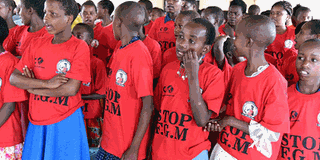Girls silently undergoing the cut at home

A section of girls who underwent the alternative rite of passage Narok County . The Anti-FGM Board now warns that the FGM rise as girls are not in school. PHOTO | POOL | NATION MEDIA GROUP
The Anti-Female Genital Mutilation Board has raised concern over the possibility of a rise in Female Genital Mutilation (FGM) cases in the country during the Covid-19 period.
The board, in a statement, says girls are at a high risk of silently undergoing the cut in in their homes now that they are out of school.
“We urge the public to ensure girls are safe, and report any case of suspected cut in their villages to the chief or the police,” the board says.
It further urges villagers and neighbours to be vigilant to guarantee girls’ safety countrywide during this time the country is fighting to contain the spread of the virus.
Remain vigilant
In a separate statement, Public Service, Youth and Gender Cabinet Secretary Prof Margaret Kobia has vowed the government will remain vigilant to ensure FGM cases do not become rampant at this time.
“We would like to assure you of the continued government support during this period. Our toll fee Gender-Based Violence (GBV) helpline 1195 remains open for 24 hours a day. I urge Kenyans to report any GBV cases through the helpline for medical and any other assistance,” said Prof Kobia .
The Kenya Demographic and Health Survey (KDHS) 2014 shows that about 21 per cent of women and girls aged between 15-49 years in Kenya have undergone FGM.
The practice is still high in some communities like Somali at 94 per cent, Samburu 86 per cent, Kisii 84 per cent and Maasai 78 per cent, despite the national decline in the prevalence.
According to ‘28 Too Many’ a values based charity working to end FGM in Africa, FGM has reduced by 10 per cent in the last ten years.
Efforts to end the menace in Kenya has not been successful as the cultural practice is still rampant in the some of the communities. The government, last year, decided to change tact in the fight against the vice, to eradicate it by 2022.
FGM advocacy
Through the National Policy on Abandonment of Female Genital Mutilation 2019 launched in November last year, the government has now turned to stakeholders to support in the fight. The State has now, through the policy, placed those subjected to and at risk of FGM, religious leaders, traditional justice systems in FGM practicing communities, and stakeholders involved in Anti-FGM advocacy in the country, at the centre of the campaign.
In the past, the provincial administration including chiefs, their assistants and the police have spearheaded the fight against FGM.
President Uhuru Kenyatta while launching the policy described the rite as an archaic cultural practice that assaults the wellbeing of individuals and society, and pitched for its complete eradication.
“FGM is a retrogressive practice whose continued existence in our country in actual fact assaults our individual and our national consciousness. The practice is inimical to our shared fundamental values as enshrined in our very own constitution that we as Kenyans passed,” the President said.
Gender equality
A new Sustainable Development Goals (SDGs) progress report released in December last year, reveals Kenya still lags behind in gender equality push including the fight against GBV.
The report by SDG Kenya Forum says violence against women is still rampant in the country.
“Despite legislative provision, sexual and gender-based violence is rampant in Kenya. Full enforcement of the law is the only way of assuring eradication of harmful practices including violence against women and girls,” reads the report.





